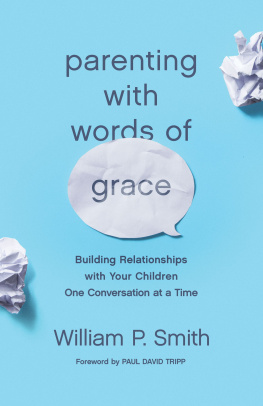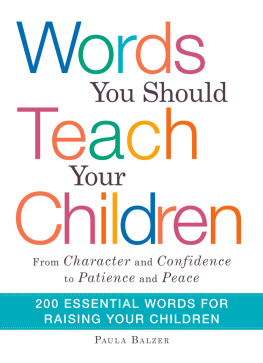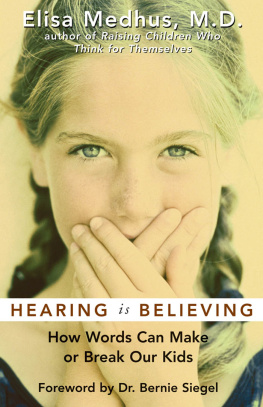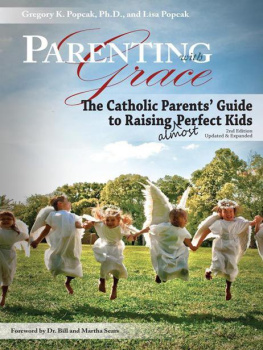Table of Contents
Landmarks
Having taken words to God and having heard words from him, you now take those same kinds of words to your children. Thats the dynamic Paul describes in his letter to the Ephesians. He reminds them how amazing it is that theyve been brought into Gods family (chaps. 12), but then he points out how much they have to learn now that theyre part of it (chaps. 46). Want to guess how that growth happens? Youre right. Most of it comes through conversations that they have with other family members (e.g., Eph. 4:15, 21, 25, 29; 5:19; 6:4, 2122).
Notice in the following section from Ephesians 4 that there are only two potential futures for his family: we can become mature or we can remain childish.
And he gave the apostles, the prophets, the evangelists, the shepherds and teachers, to equip the saints for the work of ministry, for building up the body of Christ, until we all attain to the unity of the faith and of the knowledge of the Son of God, to mature manhood, to the measure of the stature of the fullness of Christ, so that we may no longer be children, tossed to and fro by the waves and carried about by every wind of doctrine, by human cunning, by craftiness in deceitful schemes. Rather, speaking the truth in love, we are to grow up in every way into him who is the head, into Christ, from whom the whole body, joined and held together by every joint with which it is equipped, when each part is working properly, makes the body grow so that it builds itself up in love. (Eph. 4:1116 )
Gods family can flounder aimlessly, like a wave at sea subject to any and all passing breezes, or his family can grow up. Childish or mature: those are our options. And a key element in determining that outcome is how we talk to one another. Since our smaller families are modeled on Gods larger one, the way ours will grow is the same way that his does.
The question then is, Do you want a family that is mature? If so, you need to talk to the people in it like Gods people are urged to talk to each other. You need to say things that will build relationships rather than destroy them. Things like: Let no corrupting talk come out of your mouths, but only such as is good for building up, as fits the occasion, that it may give grace to those who hear (Eph. 4:29).
Take that sentence apart phrase by phrase, and youll see the beauty in it.
- Everything I say needs to be good for building others up. Every joke I tell, every tidbit of news I relay, the things I share from my day, my comments on someones haircut, the way I coach, the kind of help I give with homework, my appreciation of dinner, my expressions of gratitude for how others pitch in around the houseeverything I say needs to work at building up the people around me.
- Everything I say needs to fit the occasion , or as the NIV puts it, that it be according to what others need . That doesnt mean I say what people want to hear, but that my words are guided by what others need to hear. Before I open my mouth, I have to consider what is necessary in this moment for someone else to hear.
- Everything I say needs to have a chance to give grace to those who hear . Your words must always convey grace to the people around you for the sake of leaving them better off than before you said anything. Thats how God talks to you, his child; now you talk with that same intention to your own.
In other words, corrupting talk has nothing to do with swearing or telling an off -c olor joke. Corrupting in this context means saying anything that will hurt another person or saying something that wont help.
Thats a tall order when Im at my best, but what happens when I get blindsided by life? What about when I need to say something and Im not at my best or the other person isnt at his best? Thats when this starts to sound impossible, doesnt it?
Notice Paul doesnt say, Dont say anythingyou might be able to pull that off. Instead, he essentially says, You dont get to ignore the week l ong war your kids insist on waging in your home. You have to speak. But you can only say what will give them grace.
How is that possible? What if you grew up in an environment that rarely spoke honestly but lovingly for the purpose of leaving others better off? What if you cant remember receiving any grace -f illed experiences that you can pass along to anyone else?
I was teaching on this verse once when someone stopped me and asked, Do you really believe that? I was a little taken aback. Do you really believe that the only words coming out of our mouth are to purposely benefit others?
If you think about it, you can understand why someone would ask that. This sounds like a nice ideal, but one that is completely unrealistic. It resembles one of those simplistic things youd find in a self -h elp book: How to have good relationships with your kids: Step 1: Never Say Anything Unhelpful to Them. And you roll your eyes as you think, Yeah, okay. Ill get right on that.
It kind of sounds like advice coming from the same camp as Just say no to drugs. Just say no. And your mind rolls its eyes. Oh, Right! What were we thinking all of these years? Who knew it was that easy? Just say no, and all our youth issues will disappear, our inner cities will be cleaned up, and our suburbs will be drug -f ree .
Its advice that you might agree sounds good if only you didnt personally have a sense of how hard it is to say no: just say no to a second helping of dinner when you dont need to eat any more, but you really liked the food; just say no to dessert afterward; just say no to the really cute sweater you just have to have. Doesnt only say what is helpful for building others up feel like its in the same category?
Heres the difference. This is from God. If someone else said it, you could safely ignore him, but heres God telling you, Only [say] such as is good for building [others] up. In other words, he believes that your conversations are a key way that people experience grace in their lives or they are a key way that they experience unwholesomeness (the absence of grace). Your words will either help people understand how grace looks and feelshow God himself would speak to them if he were hereor your words will help them understand the hopelessness and meanness of hell.
Now, before you get overwhelmed, you need to realize that Paul is making an assumption in verse 29. He assumes that in order for you to speak grace to others, you have already heard grace yourself. That you have experienced grace and received grace. That you have already had the experience of someone crafting every word hes spoken to you to build you up.
Remember, our words always reflect what we ourselves have heard. Its only as you live in a gracious relationship with God that you gain a sense of what grace sounds like and, therefore, you have a sense of what to say to others. That means you need more than just ideas about life and Christianity.
Obviously knowledge and truth are essential for Christiansthats why Paul spent the first two chapters of his letter focused on theology: who this gracious God is, what hes done, and how that impacts you. But you need more. You need a present experience of this God actively loving you, and no amount of theological doctrine will give you that.
And Paul knows that. So before he focuses on how you need to talk as part of Gods family in chapters 45, he pauses in chapter 3 and prays for you to have a fresh experience of Jesus living in your heart so that you know and believe how much he loves you.
For this reason I bow my knees before the Father, from whom every family in heaven and on earth is named, that according to the riches of his glory he may grant you to be strengthened with power through his Spirit in your inner being, so that Christ may dwell in your hearts through faiththat you, being rooted and grounded in love, may have strength to comprehend with all the saints what is the breadth and length and height and depth, and to know the love of Christ that surpasses knowledge, that you may be filled with all the fullness of God. (Eph. 3:1419 )












